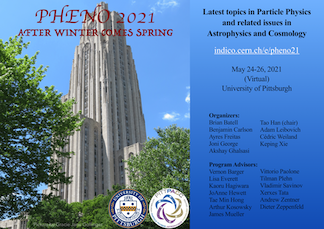Speaker
Description
Models of freeze-in dark matter that incorporate two or more dark matter mass eigenstates, typically below $\sim$100 keV, can simultaneously account for the observed baryon asymmetry, through the oscillations of the out-of-equilibrium dark matter particles. We consider the case in which the dark matter is produced by early-universe decays of electroweak-charged scalars, the lightest of which is typically in the few hundred GeV to few TeV range to realize the observed dark matter and baryon densities. Using a network of quantum kinetic equations that describe dark matter production, annihilation, and oscillations, along with washout and spectator processes, we find that the minimal model, with two dark matter mass eigenstates and a single scalar, is tightly constrained. Including Yukawa couplings of the scalar beyond its interaction with the dark matter or adding one or more additional scalars significantly expands the viable parameter space, much of which has the lightest scalar being long-lived at colliders. We discuss the model’s discovery potential at the Large Hadron Collider along with other possible experimental probes.

